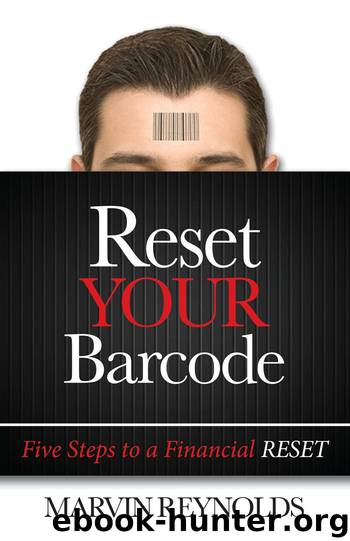Reset Your Barcode by Marvin Reynolds

Author:Marvin Reynolds
Language: eng
Format: epub
Publisher: Morgan James Publishing
2 At the time of this writing, guaranteed rates at the bank are very low, and a person would be hard-pressed to find an account paying 3%. But for our example, let’s suppose that over the long term, a 3% average is achievable.
3 To learn how to create a retirement savings plan, visit www.resetyourbarcode.com. A one-time lifetime membership fee will provide you with access to all the tools you need to predict and plan for your financial future.
CHAPTER FOURTEEN
Principle #14:
HOPING IS NOT PLANNING.
A simple definition of financial planning is deciding what you can live without today so you will know what you will have to live with tomorrow.
Many people make financial planning way more complicated than it needs to be, and way too expensive, for that matter. I know, because for years, I was as guilty as anyone. I spent large sums of money to purchase comprehensive planning software and then charged a substantial amount of money to create sophisticated plans for people. Here’s the bad news: the plan never, and I mean never, works out the way it is projected to. So here’s a pretty good question. Why would you pay a lot of money for a plan that will not turn out the way it says it will? Now, here’s the good news. You don’t have to.
One of the reasons that traditional financial plans haven’t worked out the way they forecasted is because they were built on hoped-for projections rather than guaranteed projections. For example, most plans use assumptions about rate of return, inflation, and taxation. When have we ever been able to control rate of return? Never! How about inflation? Is that something you can control? Nope! Well what about taxes? How is that working out?
When we construct a plan based on things we hope will happen instead of things we can plan on, we have a financial hope, not a financial plan.
What You Can Control
Think about the things you can actually control relative to your finances. There are only three of them. One, you can control how long you work. If you earn a large income and save enough of it, you may be able to retire earlier than someone who doesn’t. If you don’t have a large income and/or you don’t save enough, you may have to work longer. Still, the decision is yours. How long are you going to work? Some might argue that death and or disability may cut your working years short, but I contend that you can purchase protection that provides income replacement in those cases, and so you still have some control over how long you are going to work.
Two, you can control what percentage of your income you save. Even though this pill is a difficult one to swallow, spending has much more to do with the amount you save than your income does. I know people who save a pretty good chunk of a very modest income and others who save very little of their large income. The key to saving is spending (less).
Download
This site does not store any files on its server. We only index and link to content provided by other sites. Please contact the content providers to delete copyright contents if any and email us, we'll remove relevant links or contents immediately.
The Compound Effect by Darren Hardy(8974)
Tools of Titans by Timothy Ferriss(8402)
Nudge - Improving Decisions about Health, Wealth, and Happiness by Thaler Sunstein(7711)
Win Bigly by Scott Adams(7202)
Deep Work by Cal Newport(7089)
Rich Dad Poor Dad by Robert T. Kiyosaki(6642)
Principles: Life and Work by Ray Dalio(6457)
Pioneering Portfolio Management by David F. Swensen(6303)
Digital Minimalism by Cal Newport;(5767)
The Barefoot Investor by Scott Pape(5750)
Grit by Angela Duckworth(5617)
The Slight Edge by Jeff Olson(5420)
Discipline Equals Freedom by Jocko Willink(5391)
The Motivation Myth by Jeff Haden(5214)
You Are a Badass at Making Money by Jen Sincero(4934)
The Four Tendencies by Gretchen Rubin(4606)
Eat That Frog! by Brian Tracy(4543)
The Confidence Code by Katty Kay(4265)
Bullshit Jobs by David Graeber(4195)
